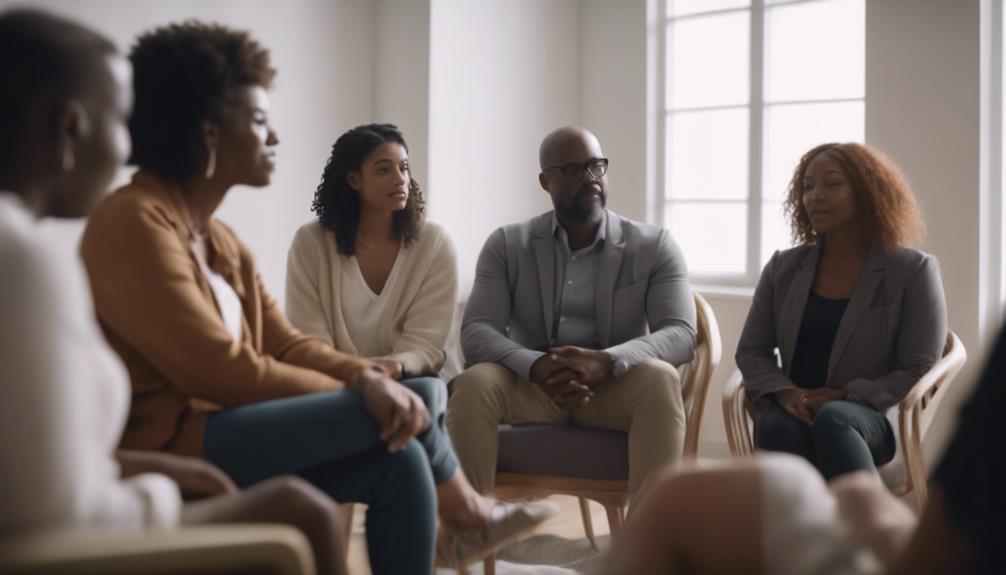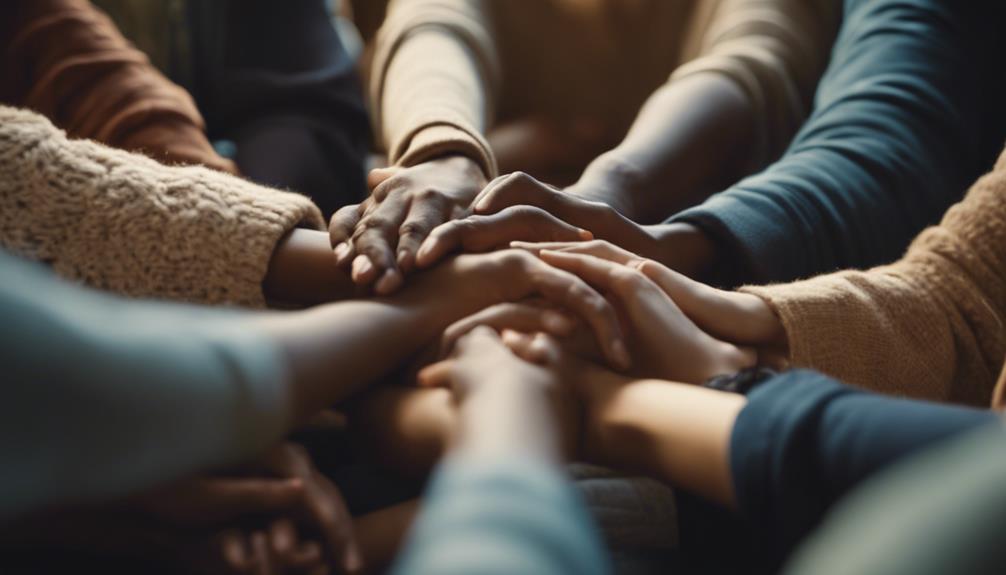When looking for the right support group for narcissistic abuse, consider factors like survivor empowerment, meeting formats, and confidentiality levels. Seek professional guidance for tailored recommendations and browse online platforms like Good Therapy for diverse options. These groups offer safe spaces to share, combat isolation, and provide coping strategies. Utilize available resources, build connections with members, and actively engage in discussions and activities. Plus, remember to prioritize self-care in your healing journey. By following these steps, you can find a supportive environment that aligns with your needs and aids in recovery.
Key Takeaways
- Consider the group's focus on empowerment and recovery education.
- Evaluate meeting formats: in-person, online, or virtual sessions.
- Ensure high confidentiality levels for safe sharing.
- Seek guidance from mental health professionals for recommendations.
- Explore online platforms for unique approaches to support.
Understanding Narcissistic Abuse Support Groups
Narcissistic abuse support groups play a crucial role in providing survivors with a safe environment to share experiences and receive validation. These groups, specifically designed for individuals who've experienced Narcissistic Abuse Syndrome, offer a supportive community where peer support is emphasized. Within the safe space of an abuse support group, survivors can find comfort in knowing that they aren't alone in their struggles. Through sharing stories and insights, members gain a deeper understanding of narcissistic abuse dynamics and learn to identify manipulation tactics employed by abusers.
Participating in an abuse support group can be empowering as survivors are encouraged to set boundaries, prioritize self-care, and navigate their healing journey alongside others who truly understand their experiences. By fostering a sense of belonging and understanding, these groups promote healing and recovery. Additionally, members have access to valuable resources, tools, and coping strategies to aid them in overcoming the trauma of abuse. Ultimately, Narcissistic abuse support groups serve as a beacon of hope and solidarity for those on the path to healing.
Evaluating Different Support Group Options

Moving from understanding the dynamics of narcissistic abuse to evaluating different support group options, it's important to consider various factors when selecting the most suitable group for one's healing journey.
When examining different support group options, consider:
- Focus of the group: Determine if the group's emphasis aligns with your needs, whether it's survivor empowerment or education on recovery techniques.
- Format of meetings: Evaluate whether the group meets in person, online, or through virtual sessions to find the most convenient option for you.
- Confidentiality: Make sure the support group offers a high level of confidentiality to establish a safe environment for sharing personal experiences.
Importance of Professional Guidance in Selection

Seeking professional guidance when choosing a support group can greatly enhance the process of finding the most suitable option for one's healing journey. Mental health professionals, such as therapists or counselors, possess the expertise to provide recommendations tailored to individual needs and experiences. Their insights guarantee that the selected support group aligns with the survivor's specific goals in healing from narcissistic abuse.
With a vast array of support groups available, guidance from these professionals can help navigate the options effectively. By seeking personalized recommendations from experts, the likelihood of connecting with a support group that meets the unique requirements of narcissistic abuse survivors increases significantly. This guidance not only streamlines the selection process but also ensures that the chosen support group offers the necessary tools and environment for healing and growth.
Trusting in the expertise of mental health professionals can lead to a more targeted and beneficial support group experience for those on the path to recovery from narcissistic abuse.
Exploring Online Support Group Platforms

When exploring online support group platforms, it's crucial to compare different options to find the right fit for your needs.
User experience insights can provide valuable information on the functionality and effectiveness of these platforms.
Platform Comparison
Exploring online support group platforms reveals a variety of options tailored to different needs for survivors of narcissistic abuse. When comparing platforms, survivors can consider:
- Good Therapy platform: Offers access to therapy specialists, support groups, and treatment centers for narcissistic abuse survivors.
- Foundations Recovery Networks: Provide interventions and support for individuals with Narcissistic Personality Disorder (NPD) through understanding the underlying mental illness.
- Mensgroup.com: Offers a supportive platform specifically tailored for men who've been victims of narcissistic behavior, encouraging healing and growth through shared experiences.
Each platform has its unique approach to providing recovery support, so individuals can choose based on their preferences and comfort level.
User Experience Insights
Upon entering online support group platforms for survivors of narcissistic abuse, one immediately notices the sense of community and understanding fostered within these virtual spaces. Users can engage in group therapy sessions, share experiences, and access resources for narcissistic abuse recovery.
These online support groups offer a safe environment where survivors can connect, validate each other's experiences, and receive support. Moderators guarantee respectful interactions, and anonymity is maintained for those seeking help without revealing their identity. Virtual meetings and discussions provide opportunities for survivors to actively participate in their healing journey.
Benefits of In-Person Support Groups

In-person support groups for survivors of narcissistic abuse offer invaluable real-time connection and empathy. Here are some benefits of joining these groups:
- Safe Space for Sharing: In-person support groups provide a confidential environment where survivors of domestic violence can share their experiences without judgment, fostering a sense of validation and understanding.
- Reduced Isolation: Face-to-face interaction in these groups helps combat feelings of loneliness and isolation often experienced by survivors, creating a supportive community of individuals who can relate to each other's struggles.
- Practical Support and Guidance: Group members can offer practical advice, coping strategies, and emotional support to each other, creating a network of individuals dedicated to healing and growth.
Being part of an in-person support group can be a powerful step towards healing, offering a sense of belonging and support that can aid in the journey towards recovery.
Considerations for Joining a Support Group

Considering key factors when joining a support group is vital for finding the right fit for your needs and goals in healing from narcissistic abuse. Before committing to a support group, evaluate its focus on narcissistic abuse recovery and healing techniques. It's important to ponder the group's format – whether it's online, in-person, or a blend of both. Look for a support group that provides a safe and non-judgmental space for sharing experiences. Additionally, check if the group offers access to mental health professionals or resources for further support. Assess the group's confidentiality measures to secure privacy and protection for all members. To help you make an informed decision, here's a table outlining key considerations:
| Considerations | Description |
|---|---|
| Focus on Narcissistic Abuse | Evaluate the group's emphasis on recovery from narcissistic abuse. |
| Format | Consider if the group meets online, in-person, or a combination of both. |
| Safe Space | Look for a supportive environment that encourages sharing without judgment. |
| Access to Resources | Check if the group provides access to mental health professionals or resources. |
Sustaining Your Healing Journey Through Support

To maintain progress in our healing journey, consistent engagement with a supportive community is essential for fostering resilience and growth. Here are three key ways to sustain your healing journey through support:
- Regular Participation: Actively engage in your support group meetings, discussions, and activities to stay connected and motivated on your path to healing from narcissistic abuse.
- Utilize Resources: Take advantage of the valuable resources, tools, and coping strategies offered by the support group to enhance your healing process and empower yourself.
- Build Relationships: Foster meaningful connections with other members of the support group to create a supportive network, share experiences, and receive encouragement along your journey of empowerment and recovery.
Frequently Asked Questions
What Organization Helps Victims of Narcissistic Abuse?
We help victims of narcissistic abuse by providing a safe space for sharing experiences and seeking guidance. Our organization, MyNARA, offers online forums and helplines for anonymous support.
Victims can access therapy, counseling, and mental health resources through us. Additionally, we provide legal aid services to assist victims in obtaining protection orders and seeking justice.
MyNARA is here to support and empower victims throughout their healing journey.
What Is the Best Therapy for Narcissistic Abuse Recovery?
When recovering from narcissistic abuse, the best therapy often combines individual counseling with group sessions.
Cognitive Behavioral Therapy (CBT) helps challenge negative patterns, while Dialectical Behavior Therapy (DBT) teaches emotional regulation skills.
Eye Movement Desensitization and Reprocessing (EMDR) can address trauma, and trauma-focused therapies like Somatic Experiencing aid psychological recovery.
These therapies, tailored to survivors, provide tools for healing and growth in a supportive environment.
How Do You Prove Narcissistic Abuse in Court?
When proving narcissistic abuse in court, documenting incidents, seeking witness statements, and gathering medical records are vital. Keeping a journal detailing abuse, effects, and manipulation attempts provides valuable evidence.
Consulting with an experienced attorney is essential in building a strong legal case. Remember, a statistic shows that 40% of victims of narcissistic abuse experience PTSD.
Taking these steps can help validate your experiences and seek justice in court.
What Are the Symptoms of Brain Damage From Narcissistic Abuse?
When it comes to symptoms of brain damage from narcissistic abuse, individuals may experience memory loss, difficulty concentrating, heightened anxiety, depression, and emotional dysregulation. Physical symptoms such as headaches, fatigue, and sleep disturbances can also arise due to the stress of abuse.
Chronic exposure to narcissistic abuse can lead to changes in brain structure and function, impacting cognitive abilities. Studies have shown alterations in the brain's stress response systems with prolonged abuse.
Conclusion
In essence, finding the right support group for narcissistic abuse is essential in your healing journey. Remember, not all support groups are created equal, so it's important to evaluate your options carefully.
Seek professional guidance if needed and consider both online and in-person support group platforms. By joining a support group that meets your needs and provides a safe space for healing, you can sustain your journey towards healing and recovery.
Remember, you aren't alone in this process.










